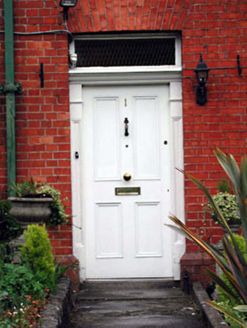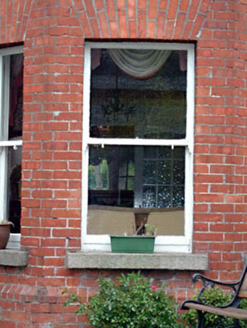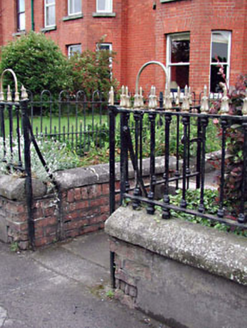Survey Data
Reg No
11814064
Rating
Regional
Categories of Special Interest
Architectural, Historical, Social
Original Use
House
In Use As
House
Date
1880 - 1900
Coordinates
289665, 219828
Date Recorded
21/05/2002
Date Updated
--/--/--
Description
End-of-terrace two-bay two-storey red brick house, c.1890, retaining original aspect with single-bay two-storey canted bay window to right (south-east) and single-bay two-storey rubble stone lower return to rear to north-east. One of a group of four. Gable-ended roofs with slate (half-octagonal to canted bay window). Red clay ridge tiles. Red brick chimney stacks. Cast-iron rainwater goods on yellow brick eaves course. Red brick Flemish bond wall to front (south-west) elevation. Rendered wall to side elevation to south-east. Unpainted. Rubble stone walls to return. Square-headed window openings (including to canted bay window). Stone sills. 1/1 timber sash windows. Timber pilaster doorcase with moulded entablature. Timber panelled door. Overlight. Set back from road in own grounds. Lawns and concrete path to forecourt. Section of cast-iron railings to forecourt with finials and cast-iron gate.
Appraisal
This is a fine and well-maintained house that retains its original form and character. Built as one of a terrace of four identical houses, the house is of social and historic interest, representing the middle-size dwellings of the prosperous merchant class in Naas in the late nineteenth century. The house also represents the early development of the outskirts of the town. The house is constructed of early mass-produced red brick, with side and rear elevations of less refined materials, including render and rubble stone. The house retains most of its original features and materials, including timber sash fenestration and a timber door. The house, together with the remaining houses in the terrace (11814061 - 3/KD-19-14-61 - 3), forms an attractive feature on the streetscape of Bladder Lane and is bounded on the side of the road by a section of decorative railings, which are a fine example of early surviving cast-iron work.









